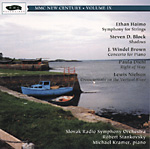Here we have an enterprising and mostly successful disc of recent works by unknown American composers. Ethan Haimo’s Symphony for Strings is a terse study in counterpoint in the manner of Roger Sessions. Its angular, dissonant motifs are underpinned by a satisfying structural logic. Steven D. Black conceived his Shadows in Jungian terms, and as such it explores the dark side of the human psyche through mysterious tuned percussion, harp glissandos, and eerie sounding strings. J. Windel Brown’s Piano Concerto (1993) is the most approachable of this collection, starting with an easygoing and relatively lengthy first movement that explores various moods and tonalities, capped off by a brief jazzy finale with a catchy tune that Michael Kramer plays with jaunty flair.
The title for Paula Diehl’s Right of Way implies much more forward momentum than the piece contains. Utilizing the composer’s “separation” technique, the music is highly concerned with the movement and order of intervals in each phrase, creating a very static sounding composition in which one section blends into the next. This work requires the listener to pay close attention for it not to seem unrelentingly gray and overly long. Lastly, Lewis Nielson’s Crosscurrents on the Vertical River is a busy, angry cacophony that, while I’m not certain it evokes water, makes an impression by virtue of its brainy technique. Conductor Robert Stankovsky knows his way around these pieces and leads highly idiomatic performances of them, even the Piano Concerto which is the most overtly “American” of the bunch. The five intrepid composers must have found it heartwarming to hear the Slovak Radio Symphony take to their music with such enthusiasm and professionalism. The sound is detailed and clear.
































